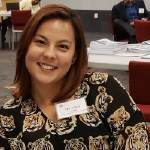Right now, when it comes to higher education, the catchphrase for 2019 sounds like “new year, more student debt.” But 2019 presents a unique opportunity for our new Congress to address our nation’s more than $1.5 trillion in student debt and reauthorize the Higher Education Act to ensure it meets the current needs of young adults seeking a higher education. Young adults experience higher education in a myriad of distinct ways, but all agree that our current higher education system needs a major update. Young Invincibles talked one-on-one with several young adults across the country on their personal experience with our higher education system. Here are their stories and how our new Congress should address their concerns.
Double down on Pell Grants
The Pell Grant program is our nation’s bedrock higher education access program for low-income students, impacting almost 8 million students annually. We must protect the Pell Grant and make sure it rises with inflation and the rising costs of college. We should also expand the program to traditionally disenfranchised populations like DREAMers and incarcerated people.
 “As a first-generation college student and immigrant, I’m grateful that state and federal financial aid programs exist because they have made it easier for me to focus on my education and less on financial obstacles. I would not have been able to attend college full-time and stay on track to graduate within four years without these programs.”
“As a first-generation college student and immigrant, I’m grateful that state and federal financial aid programs exist because they have made it easier for me to focus on my education and less on financial obstacles. I would not have been able to attend college full-time and stay on track to graduate within four years without these programs.”
– Murshedur Shahy, an environmental engineering student at City College of New York
Make way for degrees without debt
It’s time we reverse decades of disinvestments in higher education and establish federal and state partnerships to increase the amount of young people who can attend college debt-free. Any Higher Education Act reauthorization should include partnerships that allow states to expand debt-free college for in-state, 4-year, public school college students, building on the current free tuition proposals for 2-year community college students.
 “Affordability was an important factor in my decision to attend community college instead of going directly to a four-year college after high school. I chose to transfer to MSU Denver after completing community college because it’s one of the most affordable schools in Denver. By all means, I wanted to avoid student debt and be set up for success. Fortunately, I have had mentors in my life that have guided me and shared opportunities with me – I recognize not all young adults have the same luck. I think affordability issues and guidance throughout college need to be addressed to help struggling young adults have a chance at being successful while in school.” – Josephine Martinez, a Marketing and Non-Profit Studies Student at the Metropolitan State University of Denver
“Affordability was an important factor in my decision to attend community college instead of going directly to a four-year college after high school. I chose to transfer to MSU Denver after completing community college because it’s one of the most affordable schools in Denver. By all means, I wanted to avoid student debt and be set up for success. Fortunately, I have had mentors in my life that have guided me and shared opportunities with me – I recognize not all young adults have the same luck. I think affordability issues and guidance throughout college need to be addressed to help struggling young adults have a chance at being successful while in school.” – Josephine Martinez, a Marketing and Non-Profit Studies Student at the Metropolitan State University of Denver
 “My parents rooted in me the importance of pursuing a higher education at a young age. I have worked hard since to make sure I can attain a proper education by working full-time and part-time jobs while also attending community college full-time. I’m excited to continue pursuing a higher education degree as I will transfer to a four-year college to finish my bachelor’s degree, but I’m concerned about the process of paying for a four-year college.” – Oscar Sanchez, community college student in Chicago, Illinois.
“My parents rooted in me the importance of pursuing a higher education at a young age. I have worked hard since to make sure I can attain a proper education by working full-time and part-time jobs while also attending community college full-time. I’m excited to continue pursuing a higher education degree as I will transfer to a four-year college to finish my bachelor’s degree, but I’m concerned about the process of paying for a four-year college.” – Oscar Sanchez, community college student in Chicago, Illinois.
 “It’s been tough navigating the higher education system, especially dealing with financial aid to help cover my tuition and college-related expenses. Affording college was somewhat easier when I was in community college but now I’m trying to figure out how I’ll pay back the over $39,000 I owe in student debt for continuing my education at a four-year institution. I’m excited to graduate soon with my bachelor’s degree but feel tremendously uneasy about the student debt I have accumulated. Student debt is a growing national problem and our lawmakers need to respond fast.” – Yasmine Tweedy, Kinesiology Student at Cal State University, Dominguez Hills
“It’s been tough navigating the higher education system, especially dealing with financial aid to help cover my tuition and college-related expenses. Affording college was somewhat easier when I was in community college but now I’m trying to figure out how I’ll pay back the over $39,000 I owe in student debt for continuing my education at a four-year institution. I’m excited to graduate soon with my bachelor’s degree but feel tremendously uneasy about the student debt I have accumulated. Student debt is a growing national problem and our lawmakers need to respond fast.” – Yasmine Tweedy, Kinesiology Student at Cal State University, Dominguez Hills
Show us the numbers
College is one of the most important investments you make in life, but students and families are left in the dark about which institutions serve students well and which programs lead to good jobs. Lawmakers across both sides of the aisle have expressed support for legislation to connect existing datasets, maintain security and privacy, and make college’s value to students and families more transparent, so it’s time to take action to expand access to information for students.
 “In high school, I did not get the guidance and information necessary to make an informed decision about a four-year college. My counselors did not help me understand the different options available nor help paint a clear picture about college. The help I got was very basic so I did not feel confident pursuing a four-year college after high school. The financial risk of a four-year college was also a big factor in having me pursue a certificate at a community college instead. If I would have received more information about the college process and better guidance throughout, I might have attended a four-year college.” – Isaiah Jiron, a student at the Community College of Denver
“In high school, I did not get the guidance and information necessary to make an informed decision about a four-year college. My counselors did not help me understand the different options available nor help paint a clear picture about college. The help I got was very basic so I did not feel confident pursuing a four-year college after high school. The financial risk of a four-year college was also a big factor in having me pursue a certificate at a community college instead. If I would have received more information about the college process and better guidance throughout, I might have attended a four-year college.” – Isaiah Jiron, a student at the Community College of Denver
 “Being able to make informed decisions about college really comes from being able to know what the college process looks like and what each college has to offer. Unfortunately, I don’t think schools are providing that knowledge outside of telling students that college is important or that college is the only way to pursue a higher education. We need schools to step up and provide more resources for young adults to make informed decisions about college. In addition, the implementation of apprenticeship programs and other career exposure programs would benefit students by exposing them to potential career fields.” – Faiza Shaik, High School Student in Denver, Colorado
“Being able to make informed decisions about college really comes from being able to know what the college process looks like and what each college has to offer. Unfortunately, I don’t think schools are providing that knowledge outside of telling students that college is important or that college is the only way to pursue a higher education. We need schools to step up and provide more resources for young adults to make informed decisions about college. In addition, the implementation of apprenticeship programs and other career exposure programs would benefit students by exposing them to potential career fields.” – Faiza Shaik, High School Student in Denver, Colorado
Support students in the ways they really need
Programs like CCAMPIS and Federal Work Study should be updated to match the needs of today’s students. Despite a sizable increase in funding for on-campus childcare, the need for affordable care for student-parents remains largely unfulfilled. Also, funding for Federal Work Study should be increased and reformed to do more for low income students
 “As a mother, wife, and full-time college student, I have a lot of responsibilities to deal with. Navigating student life has not been easy especially as a non-traditional student, but programs like on-campus childcare make it more manageable for me to focus on school when I need to. These programs are a lifeline for student parents that can’t find affordable childcare and should expand to help more parents have a chance at higher education.” – Morchea Canonge, Student Parent at California State University in Los Angeles
“As a mother, wife, and full-time college student, I have a lot of responsibilities to deal with. Navigating student life has not been easy especially as a non-traditional student, but programs like on-campus childcare make it more manageable for me to focus on school when I need to. These programs are a lifeline for student parents that can’t find affordable childcare and should expand to help more parents have a chance at higher education.” – Morchea Canonge, Student Parent at California State University in Los Angeles
Help college students vote
All policymakers, higher education leaders, and college administrators should agree: making sure students can register and vote makes our democracy stronger and institutions of higher education have a responsibility to make that process accessible to their students. The Help Students Vote Act (HSVA) would direct schools to more effectively reach students at key points in the electoral process and facilitate increased voter participation. Higher Education Act would be strengthened by incorporating the provisions of the HVSA into any reauthorization of the Higher Education Act.
 “My mother’s hard work to keep hundreds of teachers from being laid off in my small hometown gave me firsthand experience with civic engagement and solidified the importance of voting for me. Through my work with civic engagement organizations, I have seen that students want to vote but there exist several barriers that discourage them from voting. There are many solutions to make voting easier for us such as automatic voter registration and investing in voter education classes on college campuses.” – Zoe Williamson, a Political Communication Student at Louisiana State University
“My mother’s hard work to keep hundreds of teachers from being laid off in my small hometown gave me firsthand experience with civic engagement and solidified the importance of voting for me. Through my work with civic engagement organizations, I have seen that students want to vote but there exist several barriers that discourage them from voting. There are many solutions to make voting easier for us such as automatic voter registration and investing in voter education classes on college campuses.” – Zoe Williamson, a Political Communication Student at Louisiana State University
Boost access to apprenticeships
There has been consistent federal investment in grant programs that allow states to expand their apprenticeship programs. It’s time to double down on our federal investment in apprenticeships and make sure that apprenticeship programs remain high quality.
 “Through my experience as the chairman of Denver’s Centennial Youth Commission and a member of Colorado’s State Youth Council, I have seen the many challenges that young people continue to face on a daily basis. Mental health issues remain prevalent among youth and demand to be addressed. Moreover, as a soon-to-be high school graduate, I realize the importance of apprenticeships and the positive impact it can have on the lives of young adults by exposing them to future careers. Right now, it’s basically – jump in, sink or swim for young adults – there is no preset program to help the youth succeed. Local governments and high schools should play a more proactive role in helping their youth succeed by providing young adults with more access to apprenticeships and other programs that will benefit them and create a stronger workforce.” – Delwin Maben, High School Senior in Denver, Colorado
“Through my experience as the chairman of Denver’s Centennial Youth Commission and a member of Colorado’s State Youth Council, I have seen the many challenges that young people continue to face on a daily basis. Mental health issues remain prevalent among youth and demand to be addressed. Moreover, as a soon-to-be high school graduate, I realize the importance of apprenticeships and the positive impact it can have on the lives of young adults by exposing them to future careers. Right now, it’s basically – jump in, sink or swim for young adults – there is no preset program to help the youth succeed. Local governments and high schools should play a more proactive role in helping their youth succeed by providing young adults with more access to apprenticeships and other programs that will benefit them and create a stronger workforce.” – Delwin Maben, High School Senior in Denver, Colorado
 “The opportunities I have had in life like interning at my councilman’s office and mayor’s office have happened because I have had to find these opportunities myself. I have had to develop skills that helped me become resourceful and industrious as I scoured for professional development opportunities. Not all young adults have these skills and it’s not fair to make it harder for them to find these opportunities. I know that it’s even harder for people of color like myself – we have so many other obstacles to overcome. Schools and local governments need to work together to provide more opportunities for young adults because it’s the right thing to do.” – Marlen Millan, a Political Science and Global Politics student at California State University, Los Angeles.
“The opportunities I have had in life like interning at my councilman’s office and mayor’s office have happened because I have had to find these opportunities myself. I have had to develop skills that helped me become resourceful and industrious as I scoured for professional development opportunities. Not all young adults have these skills and it’s not fair to make it harder for them to find these opportunities. I know that it’s even harder for people of color like myself – we have so many other obstacles to overcome. Schools and local governments need to work together to provide more opportunities for young adults because it’s the right thing to do.” – Marlen Millan, a Political Science and Global Politics student at California State University, Los Angeles.
